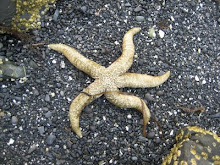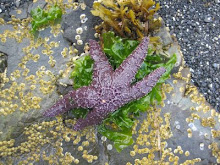There once was a boy who cut a taro leaf out of the jungle to show his Grandfather how large it was. A photo was taken of the large taro leaf. By and by the boy and his little sister, grandparents and parents wandered around the area that they lived, enjoying the jungle growth. Without thinking, the boy stuck his thumb into the meaty, fibrous stock of the taro leaf. As we were not indigenous jungle dwellers, we did not know of the consequences of sticking a thumb into the fibrous stock of the taro leaf. By and by the boy started to feel irritation on the end of his thumb and around the thumb nail. Eventually, the boy was in excruciating pain. You see, the fibrous stock is composed of little irritating hairs like what is on some types of Southwestern cactus. Small, like fiberglass, they embed in the soft skin and irritate and inflame the surrounding tissue. Unfortunately, the small hairs had to slowly be absorbed by the boys tissues and so the boy went to bed that night with a very swollen, painful thumb. His parents were so sad that they didn't warn the young boy and would have gladly taken the pain from the boy and endured it themselves if they could have. The parents had no idea that a silly taro leaf could inflict so much discomfort.
In the early nineties, our young family was
living on the island of Guam in the Western Pacific. We lived there, as I was a
licensed merchant mariner. One Sunday, while my parents were visiting, we went
for a walk to enjoy the beautiful tropical island. During our walk, our
seven-year-old son, Trevor, had me cut off a large taro leaf so that he could
show his Grandfather how big the foliage was. The leaf itself was just about as
big as our son. We took a photograph of
our son and his little sister with the taro leaf and his grandparents. As we
continued the walk, our son inadvertently, stuck his thumb into the fibrous and
meaty stock of the taro leaf. As we were not indigenous to the area, we did not know of the
consequences of that action. By and by, our son started to feel irritation on
the end of his thumb and around the thumbnail. Eventually, he was in
excruciating pain. You see, the fibrous stock is composed of little irritating
hairs like what is on some types of Southwestern cactus. Small, like
fiberglass, they embed in the soft skin and irritate and inflame the surrounding
tissue. Unfortunately, the small hairs had to slowly be absorbed by our son’s
tissues and so he went to bed that night with a very swollen, painful thumb. Of
course, our island brothers and sisters know that taro must be boiled several
times to get rid of the small fibers in order to prepare the island staple,
poi.
As parents, we felt horrible that we had allowed our young son
to do something that ended up causing him great discomfort and pain. We were so
sad that we didn't warn our son about the danger and would have gladly taken
the pain from him and endured it ourselves if we could have. We had no idea
that a silly taro leaf could inflict so much discomfort.
As members of the Church Of Jesus Christ of Later Day Saints, we
know from the Proclamation on Families that “parents have a
sacred duty to rear their children in love and righteousness, to provide for
their physical and spiritual needs, and to teach them to love and serve one
another, observe the commandments of God, and be law-abiding citizens wherever
they live.”
Seeing
the pain and anguish in our young son’s eyes made my wife and me more sensitive
and concerned about our abilities as parents to lead our children in
righteousness.
Several
years later, while living in Alaska, and working as the port captain for a
marine vessel manufacturer, it was my job to deliver new high-speed ferries to
New York City from Alaska. When it was stormy along the eastern seaboard, we
would navigate along the inter-coastal waterway to avoid the rough seas on the open
ocean. On one delivery, the weather
cleared and the seas flattened as we neared the mouth of the St. Mary’s River and
the Cumberland Sound on the Florida/Georgia state line. As we entered the mouth
of the river and the opening into the open sea we started to experience swells
coming off of the open sea. The engineer called me on the intercom and asked me
to hold up while he prepared the vessel and stowed lose equipment for the
rougher seas. It was early in the morning and we were enveloped in a thick fog.
As my eyes went from the foggy surrounding to the radar, to detect other
vessels in the fog, I noticed the fog starting to lift. Almost as if looking
down a tunnel through the opening in the fog, the beautiful, majestic stonewalls
of a fortress came into view. I could see the flag flying above this massive,
spectacular fortification. As quick as the fort had come into view, it
disappeared as the fog settled back in.
After
arriving home I did some research and found out that what I saw was called Fort
Clinch. Construction began in 1847. Unfortunately, by 1862, modern armaments
rendered the fortification obsolete and it was abandoned. Over the days and
weeks that followed, I pondered about the plight of that magnificent structure.
My natural thought process likened it to our family. Could modern worldly
influences have become stronger than the defensive walls of our home and could those
walls be rendered obsolete? As parents, we have all seen the strengthening of
the adversary since our youth. His
tactics today are more deceptive and more intrusive than ever before. Our
precious children are more exposed and vulnerable to the pain and anguish of
worldly influences than at any other time.
Thankfully, the
soothing balm of modern revelation from apostles and prophets can calm anxious
hearts.
“We
counsel parents and children to give highest priority to family prayer, family
home evening, gospel study and instruction, and wholesome family activities.
However worthy and appropriate other demands or activities may be, they must
not be permitted to displace the divinely-appointed duties that only parents
and families can adequately perform” (First Presidency letter, 11 Feb. 1999).
As a merchant mariner, nautical charts are
a “tool of the trade”. One day my eyes stopped on a warning that appears on
every nautical chart for the United States. I had read it hundreds of times but
for some reason that day it caught my eye. It states: “The Prudent Mariner will
never rely on a single navigational aid. Especially, floating aids.” Why? Because a floating aid, like a buoy that
marks a narrow channel is not always accurate because the chain that anchors
the aid to the bottom must be long enough to anchor the aid stoutly to the
bottom during the highest of tides. Unfortunately, during a very low tide, there
is a lot of slack in the chain causing the buoy to move further away from the
narrow safety of the deepest part of the channel. Many a seaman has gone aground because of
this dangerous phenomenon. Mariners are advised to use multiple aids. If a
single aid becomes inoperable and there is no backup, a perilous outcome may
result.
May I share a poem that likens this example
to the fortification of our precious families from the influences of the world?
The prudent mariner will never rely
On a single navigational aid,
To steer the ship’s course
From one single source
Is quite a mistake, I’m afraid.
The mud and the sand of the shallows and bars
Are constantly shifting, you see.
There’s treacherous shoals
And shallow atolls
It’s disaster’s best recipe.
To use multiple aids when you’re making way
Is safest and smart, you’ll agree.
Fixed landmarks and charts
And compass for starts
It’s always the best policy.
Steering through life
Is the same, I believe.
It’s best to use more than one tool,
To steer your life’s course
From one single source
Is not a common-sense rule.
Values are shifting with standards adrift.
It’s easy to wander off-course.
To navigate true
And endure till you’re through
You need an unchanging source.
Look to the Ensign and Conference Talks,
Home Evening and family prayer.
Use multiple aids
The tools of the trade
To steer you through worldly snares.
So as you sail out on the oceans of life
Be prudent, my friend, and you’ll see
That the prophet’s sure voice
And scripture-based choice
Will steer you true . . . . . eternally.
























